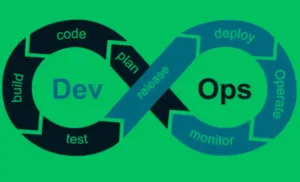
In the digital age, the speed of software development and deployment has become a decisive factor for the success of companies in the market. This is where the concept of” development and operations ” (development and operations) comes in, reflecting a fundamental change in the way IT teams work. It is not just a set of tools or processes, but a holistic culture aimed at improving cooperation between development and operations teams to ensure fast delivery. And effective, high-quality programs.
In this article, we will study the BASICSDEVOPS, the benefits it provides to companies, as well as the challenges that can be encountered during its implementation, highlighting some of the tools and technologies used in this area.
History and historical development of DevOps
The term “DevOps” was first used in 2008 at the Agile conference in Toronto by Belgian engineer Patrick Dubois, who emphasized the idea of integrating development and operations functions.
The first official conference on DevOps practices and culture was held in Ghent, Belgium, in 2009, under the chairmanship of Patrick Dubois. This conference was the starting point for the spread of the DevOps movement and its further development.
Since then, the DevOps philosophy has evolved It has spread rapidly throughout the technical community, and many companies and organizations have adopted it to optimize development and production processes. This development has been driven by rapidly changing customer needs and the need for faster and more reliable software delivery.
Thus, we can say that the history of DevOps begins with the introduction of the concept in 2008 and its wider dissemination after the start of its first conference in 2009. The significant development and dissemination of the DevOps culture and concepts continued over the following years.
DevOps goals
Continuous Delivery: The goal of DevOps is to optimize the process of delivering software faster and more efficiently, based on frequent testing and deployment.
Reduce errors: DevOps focuses on detecting and resolving problems as early as possible, to reduce errors and delays in the development process.
Integration and Collaboration: DevOps aims to promote integration and collaboration between development and operations teams, eliminating the traditional gap between them.
Respond to changes: DevOps strives to be flexible and adaptable to rapid changes in customer and market demands.
Quality Improvement: DevOps focuses on improving software quality through continuous testing and improvement.
Increased productivity: DevOps aims to accelerate the pace of development and deployment and improve overall production efficiency.
Components of DevOps
These three components are the foundation on which DevOps practices are based with the aim of accelerating development and improving quality:
Practical culture
Culture is the basis of DevOps. It focuses on collaboration and continuous communication between development and operation teams. This includes:
- Encourage the sharing of responsibilities and common goals between teams.
- Removing traditional barriers and the gap between development and operations.
- Adopt the thought of the overall perspective of the overall process instead of focusing on separate sections.
- Stimulate innovation and continuous improvement.
Technological automation
DevOps relies heavily on technical automation to minimize manual labor and human errors. This includes:
- Automate the construction, testing, and deployment processes.
- Use project planning and management tools such as Jira and Trello.
- Automate infrastructure management and configurations using tools such as Ansible
Communication and cooperation
DevOps focuses on enhancing communication and collaboration between development and operational teams by:
- Use tools for communication and coordination such as Slack and Microsoft Teams.
- Organize daily short meetings (stand-up meetings) to discuss progress and challenges.
- Transparent exchange of knowledge and information between teams.
- Involve all interested parties in the decision-making process.
The benefits of DevOps
The application of the DevOps methodology brings many important benefits to enterprises:
- Continuous Software Delivery: DevOps enables organizations to continuously create and deliver new software versions, increasing their ability to adapt to customer requirements.
- Less complex project management: DevOps simplifies the process of managing software projects through automation and integration of various stages.
- Accelerate finding solutions: DevOps helps to find solutions to problems faster, through integration and collaboration between development and operational teams.
- Quality improvement: DevOps improves the quality of programs and services through continuous testing and improvement.
- Risk reduction: DevOps helps reduce the risks associated with development and production through automation and redundancy.
- Increase productivity: DevOps enhances productivity and efficiency by speeding up processes and improving collaboration.
Applications of DevOps in various industries
DevOps has become widely adopted in many industries, as it has proven its effectiveness in improving development and production processes and increasing efficiency. Here are some examples of DevOps applications in various sectors:
Technology
Tech giants like Amazon, Netflix, and Etsy all use DevOps to ensure the quality of their products and improve their usability. These companies are among the pioneers in adopting the DevOps culture and applying its practices.
Banking and finance
Banks and financial institutions use DevOps to increase the speed of development and reduce errors in payment systems and critical money transfers.
Health care
DevOps practices help health organizations accelerate the development of medical applications and healthcare systems, improving the quality of services provided to patients.
Computing infrastructure
Cloud and telecom infrastructure companies are using DevOps to manage complex infrastructure environments more efficiently and deliver faster services.
So, we note that DevOps has been widely spread across various industries, where it has proven its ability to significantly improve the efficiency of development and production processes.